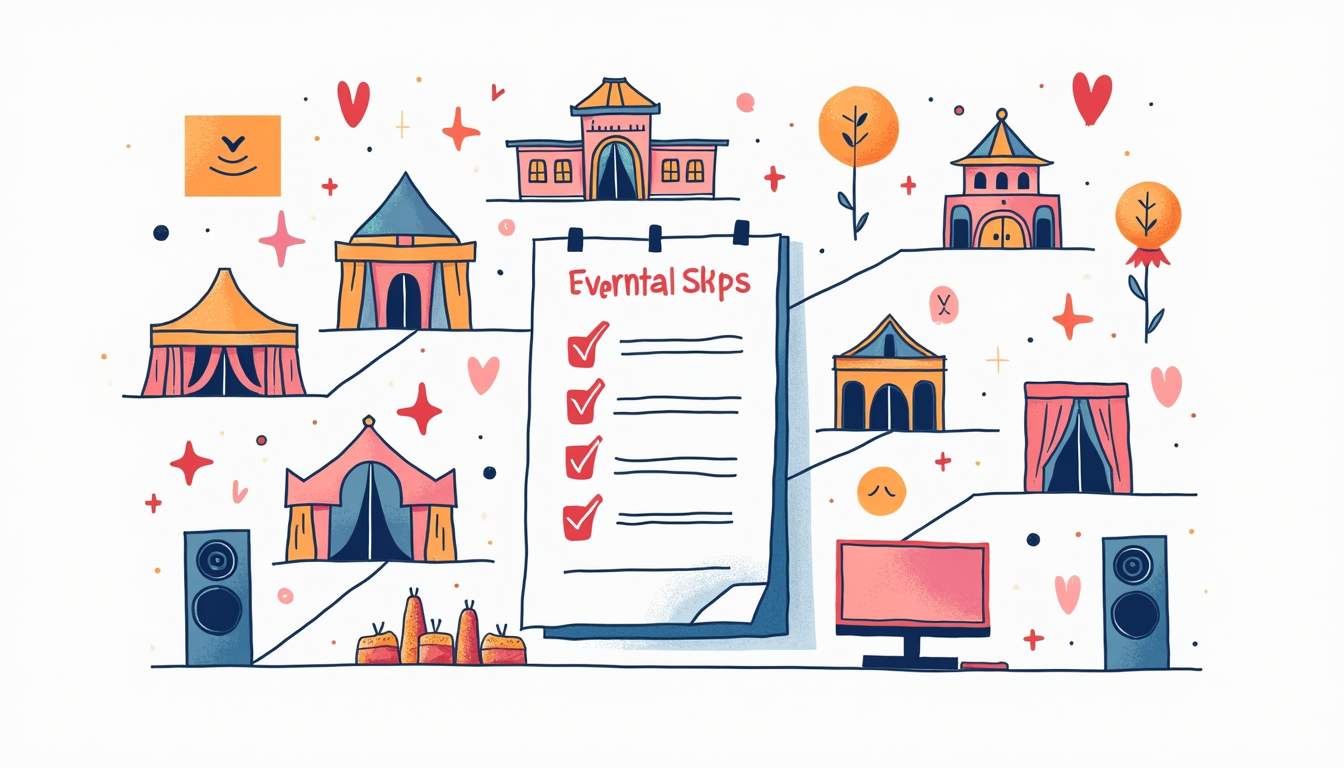
Organizing an event can be a daunting task, but with the right strategies and tools, it can also be an incredibly rewarding experience. Whether it’s a corporate gathering, a wedding, or a community festival, flawless execution is the key to ensuring that everything runs smoothly. This article will explore essential tips and best practices for effective event management, helping you create memorable experiences for your attendees.
Understanding Your Goals and Objectives
Before diving into the nitty-gritty of planning, it’s crucial to define the goals and objectives of your event. This foundational step will guide all your decisions and strategies throughout the planning process.
Define the Purpose
Every event should have a clear purpose. Are you looking to educate, entertain, or promote a product? Understanding the primary goal will help in crafting the event’s theme, content, and activities. For example, a corporate seminar might focus on knowledge sharing, while a charity gala aims to raise funds. Additionally, the purpose can dictate the tone of the event; a formal conference may require a more serious atmosphere, whereas a product launch could embrace a vibrant and celebratory vibe to excite attendees about the new offering.
Identify Your Target Audience
Knowing who your audience is will significantly influence your planning. Tailoring the event to meet the interests and expectations of your attendees can enhance engagement and satisfaction. Consider demographics such as age, profession, and interests, and use this information to shape your event’s content and format. For instance, if your audience consists primarily of young professionals, incorporating interactive elements like networking activities or tech demonstrations could resonate well. Conversely, if your attendees are seasoned experts, offering in-depth workshops or panel discussions led by industry leaders might be more appropriate.
Moreover, understanding your audience’s preferences can also inform logistical decisions, such as venue selection and catering options. A tech-savvy crowd may appreciate a venue equipped with the latest audiovisual technology, while a more traditional audience might prefer a classic setting that exudes elegance. Additionally, dietary considerations based on cultural backgrounds or health trends should be taken into account when planning the menu, ensuring that all attendees feel included and catered to during the event. For expert assistance in event planning, visit The Ann Savva Group to explore how they can help bring your vision to life.
Creating a Comprehensive Plan
Once you have a clear understanding of your goals and audience, it’s time to develop a detailed plan. A well-structured plan serves as a roadmap for the entire event, ensuring that you stay on track and meet deadlines. Consider incorporating feedback loops in your planning process; this allows you to gather insights from team members and stakeholders, which can lead to improvements and refinements in your strategy. Engaging with your team can also foster a sense of ownership and commitment to the event’s success.
Budgeting Wisely
Establishing a budget is one of the most critical aspects of event planning. It’s essential to outline all potential expenses, including venue rental, catering, entertainment, and marketing. Allocate funds to each category and always include a contingency fund for unexpected costs. Regularly review your budget to ensure you’re staying within limits. Additionally, consider exploring sponsorship opportunities or partnerships that can help alleviate some financial burdens. These collaborations can not only provide extra funding but also enhance the event’s reach and credibility.
Timeline Development
Creating a timeline is crucial for keeping the planning process organized. Break down tasks into manageable segments and assign deadlines. This not only helps in tracking progress but also ensures that no detail is overlooked. Utilize project management tools to visualize the timeline and keep everyone on the same page. It can also be beneficial to schedule regular check-ins with your team to discuss progress and address any challenges that may arise. These meetings can serve as a platform for brainstorming solutions and reinforcing team cohesion, ultimately leading to a smoother planning process.
Selecting the Right Venue
The choice of venue can make or break an event. It’s important to select a location that aligns with your event’s theme, accommodates your audience comfortably, and offers the necessary facilities. A well-chosen venue not only enhances the overall experience but also reflects the professionalism and attention to detail of the event organizers. Whether it’s a corporate meeting, a wedding, or a community gathering, the right setting can create an atmosphere that resonates with the purpose of the event.
Consider Accessibility
Accessibility should be a top priority when choosing a venue. Ensure that the location is easy to reach for all attendees, including those with disabilities. Consider factors such as parking availability, public transport links, and wheelchair access. A venue that is convenient will encourage higher attendance and satisfaction. Additionally, it’s wise to think about the surrounding area; venues located near hotels or restaurants can provide added convenience for out-of-town guests, making their experience more enjoyable and less stressful.
Evaluate Amenities and Services
Different venues offer varying amenities and services, so it’s essential to assess what each location provides. Check for audio-visual equipment, Wi-Fi availability, catering options, and seating arrangements. A venue that can accommodate your technical needs will alleviate stress on the day of the event. Furthermore, consider the flexibility of the space; a venue that allows for customizable layouts can enhance the flow of your event, whether you require a theater-style setup for presentations or a more intimate arrangement for discussions. Don’t forget to inquire about on-site staff support, as having knowledgeable personnel available can significantly ease logistical challenges during the event.
Effective Marketing Strategies
Utilize Social Media
Social media platforms are powerful tools for promoting events. Create engaging content that resonates with your target audience, and use relevant hashtags to increase visibility. Consider running contests or giveaways to encourage shares and engagement. Regular updates leading up to the event can keep the excitement alive.
Email Marketing Campaigns
Email marketing remains one of the most effective ways to reach potential attendees. Craft compelling emails that highlight the event’s benefits, schedule, and speakers. Personalization can significantly increase open rates, so segment your audience and tailor messages accordingly. Don’t forget to include clear calls to action for registration.
Logistics and Coordination
Logistics play a vital role in ensuring the smooth execution of an event. From coordinating vendors to managing on-site operations, attention to detail is key.
Vendor Management
Choosing reliable vendors is essential for a successful event. Whether it’s catering, audio-visual services, or entertainment, ensure that you vet vendors thoroughly. Check references, read reviews, and conduct interviews to gauge their reliability and professionalism. Establish clear communication channels and set expectations to avoid misunderstandings.
On-Site Coordination
On the day of the event, having a dedicated team for on-site coordination can make a significant difference. Assign roles and responsibilities to team members and ensure everyone is aware of their tasks. A well-organized team can quickly address any issues that arise, keeping the event on track.
Engaging Attendees
Creating an engaging experience for attendees is essential for the success of any event. This can lead to higher satisfaction rates and increased likelihood of attendance at future events.

Interactive Activities
Incorporating interactive activities can enhance attendee engagement. Consider workshops, Q&A sessions, or networking opportunities that encourage participation. These activities not only make the event more enjoyable but also foster connections among attendees.
Feedback Mechanisms
Gathering feedback during and after the event can provide valuable insights for future improvements. Use surveys, polls, or informal discussions to gauge attendee satisfaction and gather suggestions. This feedback can help refine your approach and enhance future events.
Post-Event Evaluation
Once the event concludes, it’s essential to conduct a thorough evaluation. This step allows you to assess what worked well and what could be improved for future events.
Analyze Key Metrics
Reviewing key performance indicators (KPIs) can provide insights into the event’s success. Metrics such as attendance numbers, engagement levels, and social media reach can help you understand the impact of your efforts. Analyzing these metrics can inform your planning for future events.
Debrief with Your Team
Hold a debriefing session with your team to discuss the event’s successes and challenges. Encourage open dialogue and constructive feedback. This collaborative approach can help identify areas for improvement and strengthen your team’s cohesion for future projects.
Leveraging Technology
In today’s digital age, technology can significantly enhance event management. From planning to execution, leveraging the right tools can streamline processes and improve attendee experiences.

Event Management Software
Utilizing event management software can simplify many aspects of planning and execution. These platforms often include features for registration, ticketing, scheduling, and communication. By centralizing information, they can save time and reduce the likelihood of errors.
Virtual and Hybrid Events
With the rise of virtual and hybrid events, incorporating technology has become even more crucial. Platforms that support live streaming and virtual engagement can help reach a broader audience. Ensure that the technology used is reliable and user-friendly to enhance the overall experience for both in-person and virtual attendees.
Building Relationships and Networking
Networking is a vital aspect of any event, providing opportunities for attendees to connect and build relationships. Fostering a networking-friendly environment can enhance the overall experience.
Facilitating Connections
Consider incorporating structured networking sessions or icebreaker activities to encourage attendees to mingle. Providing opportunities for introductions can help break down barriers and foster meaningful connections. This can be particularly beneficial in corporate events where networking is a primary objective.
Follow-Up After the Event
Post-event follow-up is crucial for maintaining relationships. Send thank-you emails to attendees, speakers, and sponsors, expressing gratitude for their participation. This gesture not only shows appreciation but also keeps the lines of communication open for future collaborations.
Conclusion
Flawless execution in event management requires careful planning, attention to detail, and a focus on attendee engagement. By understanding your goals, creating a comprehensive plan, and leveraging technology, you can create memorable experiences that resonate with your audience. Remember, the success of an event is not solely measured by attendance but by the connections made and the experiences shared. With these tips in mind, you are well on your way to executing successful events that leave a lasting impact.
